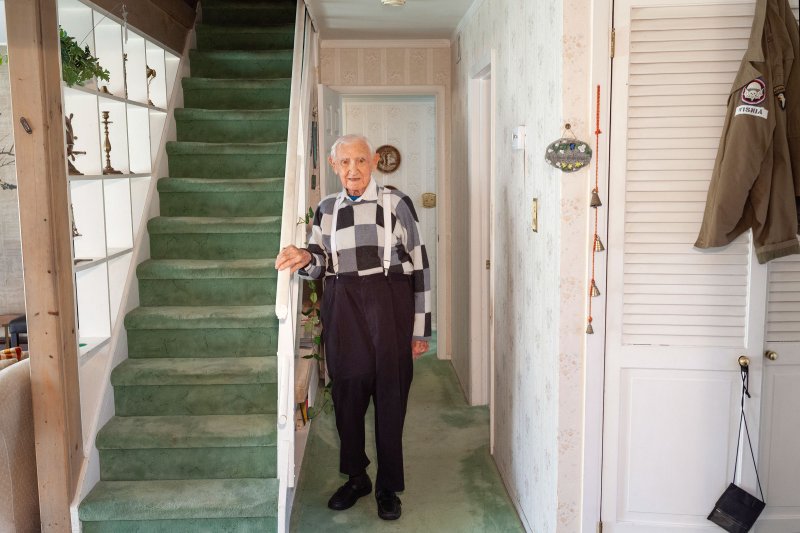Every year, International Holocaust Remembrance Day marks the anniversary of the Jan. 27, 1945, liberation of Auschwitz, Nazi Germany’s biggest death camp, where more than 1 million Jews were murdered or died there.
And yet, 79 years later, new information about what life in Auschwitz was really like is still coming out. The latest is Keren Blankfeld’s Lovers in Auschwitz: A True Story, a book out Jan. 23 about two Jewish prisoners who managed to date while imprisoned, but went their separate ways after the liberation and would not see each other again for 72 years.
David Wisnia and Helen “Zippi” Spitzer both endured hard labor at Auschwitz. He carried dead bodies, she carried stones. But when the Nazis discovered they each had skills that could be useful, the two were promoted. The Nazis had David, an opera singer, perform for them. Zippi, a graphic designer, was tasked by the Nazis to design various diagrams of the camp and spot-clean the uniforms.
Zippi and David first met at “the sauna,” where uniforms were cleaned, likely in early 1943. Blankfeld writes that they went on to exchange stolen glances. David would make a point to try and brush against her sleeve and she’d murmur “hello.” They started to communicate by passing notes through messengers. Around February 1944, they had their first “date”; he was 18 and she was 25. Zippi had fashioned a makeshift ledge at the top of a new warehouse called Canada, and they climbed there using what was essentially a ladder made out of tightly bound jackets, pants, coats—clean clothing confiscated from prisoners at arrival. They built a little room for their meetings, the walls of which were made out of these removable bricks of clothing.
For roughly 30 minutes to an hour, fellow inmates kept watch, likely in exchange for food, clothes, or protection. The duo bonded over a shared love of music. He was a child star in Warsaw and she played a mandolin in an orchestra in Bratislava. She taught him a Hungarian song which translates in English to “Evening in the Moonlight.”
As Blankfeld describes the relationship, “They sang to each other. They kissed. From what he said, it was much more physical than anything else.”
At one point they had made a pact to meet each other in Warsaw after the war. Zippi went there, but David ended up getting a job with the American military and saw that as his ticket to freedom. As Blankfeld describes the role, “He went from Nazis interrogating him and being a prisoner to interrogating Nazis.” Zippi, devastated, went back to Bratislava where she grew up and then went on to work at the displaced persons camp Feldafing.
Following the military, David moved to Levittown, Pennsylvania, to raise a family and worked selling encyclopedias and singing as a cantor. But he always wondered how he made it out of Auschwitz alive when millions did not. Through fellow survivors, he tried to reach out to Zippi, but she was too hurt to meet him in person. Plus, she had married and didn’t think it would be appropriate. While David would speak publicly about his Holocaust story, she chose to share her experience with select historians whom Blankfeld interviewed for the book.
But in August 2016, Zippi finally let David come over to her Manhattan apartment. By then, her husband had passed away and she was homebound. But the two picked up where they left off, and he introduced her to his grandchildren. When David asked how he had survived Auschwitz, she told him that she saved him five times. She’d removed his name from lists of prisoners to kill. Then she asked him to sing to her and he sang her the Hungarian song she taught him.
Zippi died two years later at the age of 99, as did David in 2021, at the age of 94. But their stories live on in Lovers in Auschwitz. Blankfeld, a journalist, met David around 2018, when she was referred to him while researching the stories of refugees who came to the U.S. during World War II. Blankfeld visited him at his home and interviewed him about what it was like to survive Auschwitz. Then as she was getting up to leave, he mentioned that he’d had a girlfriend while being imprisoned at the concentration camp. Blankfeld sat back down and listened as David described the courtship, then looked into everything she could find out about Zippi. She interviewed Zippi’s historian confidantes and found an unpublished manuscript by Zippi that became invaluable to Blankfeld’s book.

Lovers in Auschwitz adds to the history of resistance during the Holocaust, and is an example of a rare story of joy during an incredibly dark time. The Nazi camps were designed to break prisoners’ spirits, but they could not break this couple’s spirit. As Blankfeld explains, “As you walked into the camp, the first thing they did was shave your hair, desexualize you and give you a number. You were no longer a person; you became a number. Having a romance under these conditions, it’s a way of keeping your humanity, not allowing yourself to become this number. [David and Zippi] were more than that. That’s a huge act of resistance.”




